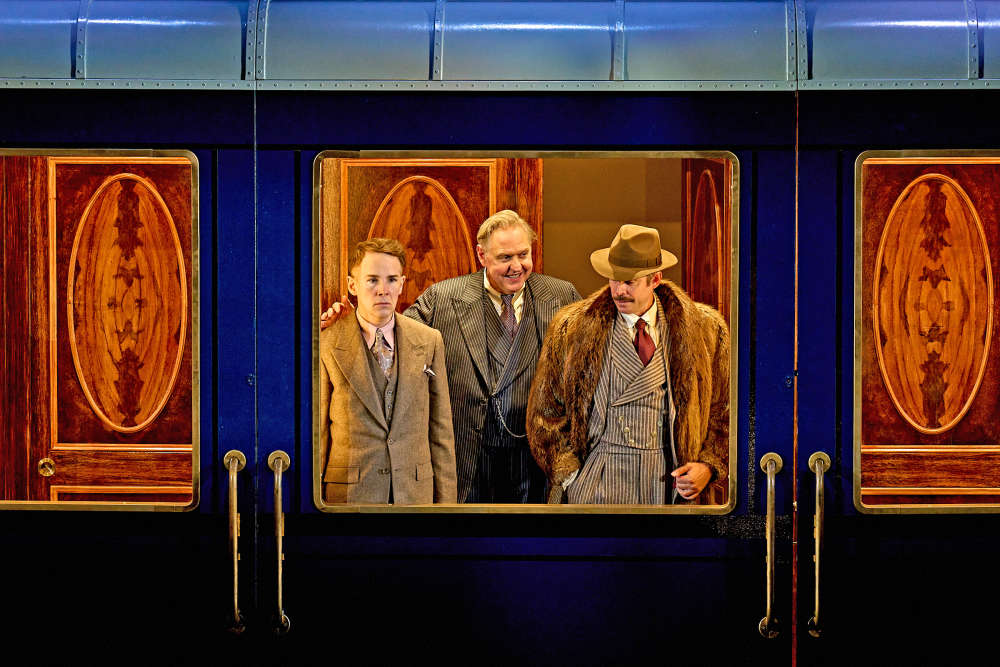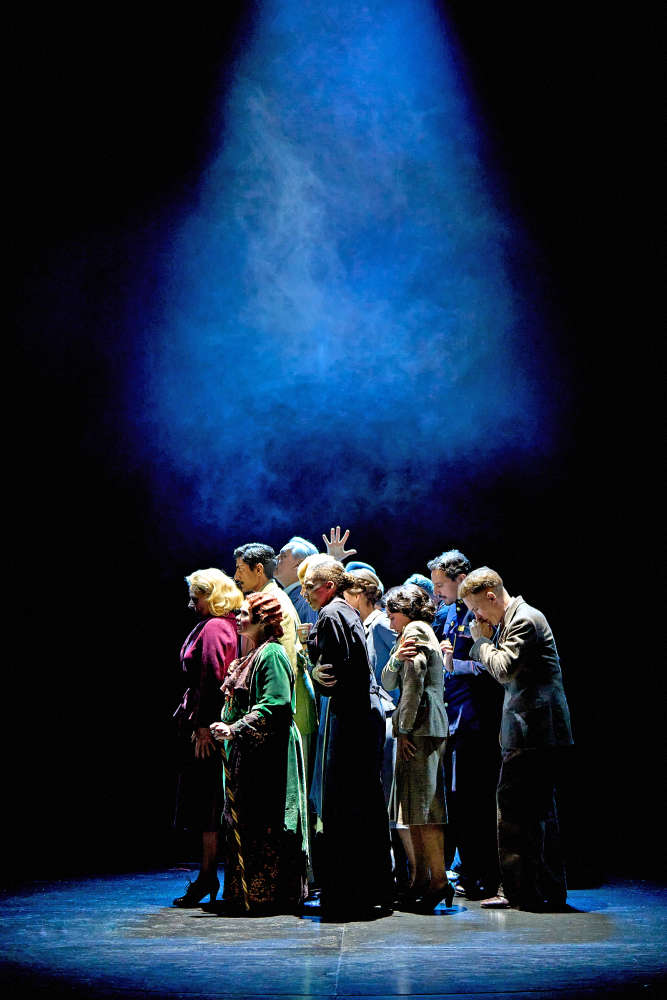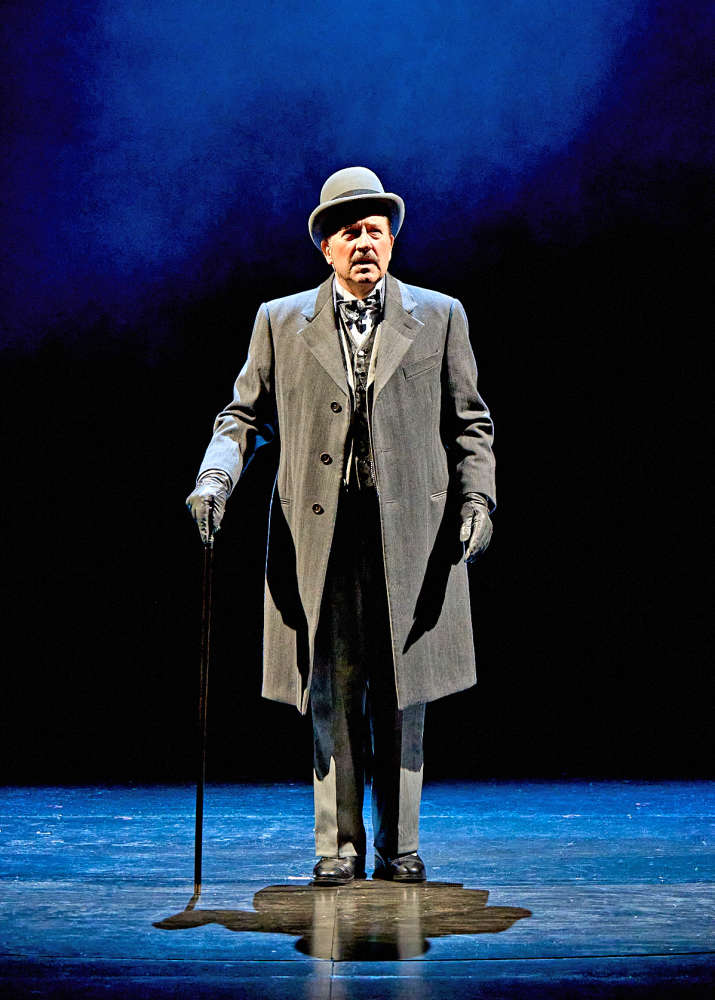

Search
Murder on the Orient Express - interview with Simon Coton
Voice FM Arts and Culture Podcast
Monday, 17 February 2025 - 14 minutes
 Xan Phillips: This is Southampton's Voice FM. My name is Xan, and welcome to Arts and Culture. Now, towards the end of February, the Orient Express pulls into Mayflower Theatre, and on board, one passenger has been murdered. But unfortunately for the killer, another passenger is Hercule Poirot, the famous Belgian detective.
Xan Phillips: This is Southampton's Voice FM. My name is Xan, and welcome to Arts and Culture. Now, towards the end of February, the Orient Express pulls into Mayflower Theatre, and on board, one passenger has been murdered. But unfortunately for the killer, another passenger is Hercule Poirot, the famous Belgian detective.
Also on board is the character Samuel Ratched, who is played by star of stage, screen, and TV, Simon Cotten. And he joins us on the line. Simon, a very good afternoon to you. How are you?
Simon Cotton: Good afternoon. I'm very well. I'm in sunny Sheffield at the moment. And yeah, very well. Thank you.
Xan Phillips: Now, I didn't mention this to the listener, but you are also a writer.
Do you think the title of the play is one of the most evocative in theatre?
Simon Cotton: I do in literature, I would argue, but actually, interestingly, the writer of our play, our adaptation Ken Ludwig, who's an American writer, very, very successful, has more plays on than anybody in the world at any one time.
He he spent the first week of our rehearsals with us, which was amazing. And he told us that the reason when the Agatha Christie estate approached him and they said, choose any book, adapt it. Whichever one you like, and he went straight for Murder on the Orient Express, and he said the simple reason for that was the title.
So I think if if Mr. Ludwig says that it's it's the most evocative, then I think, yeah, I agree with him.
Xan Phillips: And as a writer then, when you're reading what he's done to the book, where, where are you seeing Ken Ludwig's skills?
Simon Cotton: Well, he, I mean, he's He's managed to take something that obviously is, it sounds stupid, but it's two dimensional.
It's it's there for the reader's imagination. You read it on the page and it's totally your, you create your world in your head when you're reading a book. And he's essentially. three dimensionalising it. So naturally that comes with challenges that actually are the responsibility of the director, the designer, ultimately.
But for, for him, he, he needs to create something that stays true to the spirit of the book, stays true to the spirit of Christie, but is also something that an audience want to spend two hours of an evening being thoroughly entertained by, and I think that's, I think that's the key kind of difference is that we set out not just to tell a classic whodunit story a murder mystery but also to entertain along the way.
So he's the, the tone of our piece definitely has a lot of kind of Ken Ludwig's characteristics in it. There's a lot of humour and it's just a kind of rollicking adventure. And I think you need that in theater. I think you have to be, to pardon the pun, taken on a journey. And as soon as you kind of step onto the platform in our first scene, then, you know, we try.
to take the audience on that journey. And that process starts with Ken, the writer, creating the the place for us to do that.
Xan Phillips: And, and your lines before we actually get into the character itself and those aspects, but you're the lines that you're saying. How do they compare to other lines that you've had?
Is there a flow? Is there a a is a different Ling way?
Simon Cotton: Yeah, that's, that's a good question actually. I mean, I, yes, there's a real and that it goes back to that kind of sense of really like once you're on board the journey, once you're onboard the train, it's like bumba, bum, bum. It's quiet at a pace.
And that comes down to actors as well. of course, a director, but within the lines, there's just, there's a lot of rhythm. My character's scenes, without giving too much away, it's kind of the first time I'm, I'm allowed to sit in it a little bit. I have to kind of make an impact in the time I have.
And I've been given a kind of license to sit in it, but at the same time, yeah, it's just written in a way. I mean my character is Italian American, which as you can probably tell from my accent, I'm quite far away from being Italian American. But I remember before I even auditioned and I got the I got the script and it just came very naturally to me.
And I think that's. without doubt, like credit to the writing. It just sits, it feels very natural. It feels very, the characters all feel, even though they're quite in a way heightened in a way, exaggerated version of the kind of characters, you know, and love they, they're, they're very naturally written.
They sit very nicely. And that again, is just down to Ken Ludwig's immense skill.
Xan Phillips: Well, what the listener can't see is you've got a moustache, which actually makes you very Italian, at least not about Italian American, but definitely Italian. But so when you're working on this character, the, the, the, the first thing you have to inhabit what else did you draw from to, to fleshing out?

Simon Cotton: Well, we were, I mean, we were really blessed in this production of amazing director Lucy Bailey. She believes in. actors kind of feeling exactly that, like, that they have a foundation before you really start working on the script. So we spent a lot of time as a group of actors not only workshopping it before we actually started rehearsals, although I wasn't actually involved in that workshop, but then when it came to rehearsals, really kind of working on our backstories, working on our relationships to each other, our relationships within the geography of the play the geography of the world at the time, because, you know, it's a historical play, so you kind of have to know where you are within history.
And yeah, a lot of other things I've worked on. Sometimes everyone's on a very busy, stressful schedule and you don't necessarily get the time to luxuriate in that. We actors love those sort of processes. And Lucy really gave us the opportunity. A lot of it you have to do on your own.
It's kind of homework, but I think that depends on what type of actor you are, how deep you want to go. But I find that it is, it's quite literally the deeper the foundations, the more solid the eventual kind of performance will be. So yeah, it comes from play and it comes from imagination. And I think a lot of the reason that us actors get into it isn't just for audiences in front of us and doing the actual performance.
It's all that kind of like what you do when you're a child and you're imagining a world. We're just imagining people. It's all there in the scripts and then it's just kind of taking that on and running with it.
Xan Phillips: Well, the sets are looking fantastic. So I'm, I'm really looking forward to this one. And when you're on stage, when you're taking part in something like this, which is only a snapshot, it doesn't make you hanker for wishing that you were living in those times.
Yeah. Well, obviously with the ability to go on the Orient Express. Oh, for
Simon Cotton: sure. I mean, I've heard that the we were told that to go on the Orient Express now, as it still exists, of course, will set you back. £17k pounds. So yeah, none of us are doing that anytime soon. Perhaps maybe if our producers are feeling generous at the end of this.
But yeah, no, it is a bit, again, I think that's part of why we do what we do. I mean, it's so much fun, particularly like. at the start of a production when you're all getting together. We have an incredible designer, Mike Britton, and he's, he's kind of designed not only a beautiful set, a clever set, but our individual costumes are fantastic.
My costume, without giving too much away, is, yeah, I probably won't ever wear anything as cool in my career again. And it's just fun. It's just fun being backstage with all these, you know, all your friends, castmates wearing these incredible things and you just feel part of it. I personally, I have to say, there were quite a few hats in our play and I don't understand why people don't wear hats anymore.
You know, the Federer's, Trilby's, I don't understand where they've gone. Everyone looks so good in them and yeah, they disappeared. Hey, I'll try and bring them back.

Xan Phillips: I think you should, Simon, I think you should. Now, you're talking about having fun backstage, but on stage is where the action is. Do you have many sort of mental tussles with the star Hercule Poirot?
Simon Cotton: As a character?
Xan Phillips: Yes.
Simon Cotton: Yes, yes, we do. We have we have a very juicy scene. And it's a lot of fun. It's a lot of fun to play. I have another character. Played by Christine Kavanagh, who also kind of gets under my skin. I'm generally quite an angry character, so pretty much everyone on stage angers me.
But yeah, Mr. Poirot, who is played just, I mean, unbelievably by Michael Maloney. Yeah, we have one scene together that is, well, a couple of scenes together, but one in particular that is great fun to play. I think, I hope, for both of us. But then we're friends at the end of it. So what the audience won't see is that a scene that comes a few minutes after we've just been going head to head on stage, he'll come into my little compartment and we'll catch up on the day and then he'll run off and do his next line.
And that's, that's the joy of theatre that the audience don't see what's happening quite literally just behind these closed doors.
Xan Phillips: But it must be great fun to be able to get that out of your system night after night, because I know it's lovely being friendly and lover and all that kind of stuff, but when you get the anger going, a certain amount of energy is released, isn't it?
Simon Cotton: Oh, sure, for sure, yeah. I'm drawn to, I don't know why, I quite often play villains, nasty characters, and I'm really kind of I'm quite mellow in normal life. I'd like to think I'm quite a nice guy. But I always play these horrible, horrible characters and I have done since I was, you know, 15 and first started acting.
So it's a, it's an odd thing, but I'm drawn to it. I love it. I just love, I think for me, it's not just kind of getting it out, but I think what fascinates me about stage acting in particular is this. transference of power on stage. And he, you know, it exists within comedy, exists within tragedy, exists in all type of theater.
And it's, that's what as an audience member excites me when I go to theatre and on stage I just love that idea of, of who has the power in that moment. And my character is a real kind of, I get to, I get to play with that quite a lot.
Xan Phillips: That sounds like great fun. So is, is, is the next item that you're going to write?
I know you didn't write this, you're, you're an actor, but you are also a playwright. That's how we begun this conversation. But after doing this, do you feel like your next play could be a whodunit? Ooh, I mean,
Simon Cotton: you have to be so clever to write them. I guess you have to start, start from the end. But nowadays, if you look at anything, anything on TV that is particularly on TV, that's everything that's popular exists within this realm of, even if it's not necessarily that classic crime, whodunit, it's that cliffhanger at the end of every episode, like what's happening here?
Why, why is this person doing that? What does this mean? And I think it's probably always existed, but at the moment there's just such a thirst for it. So yeah, I'm always thinking about, as a writer, I'm always thinking about, kind of, cliffhangers, twists. I just think that's what the appetite is for at the moment.
And yeah, it is funny that I'm in a, in a play with One of the, I think one of the all time twists actually. So yeah, it's great stuff.
Xan Phillips: Well, it's been a pleasure speaking to you, Simon, and thank you very much for giving us an insight, not only into the acting world but also to the world of writing as well, because it's that's something that we.
generally forget about. The director and the writer are usually forgotten once the curtain call comes.
Simon Cotton: They are, I know, I know. So, we try and keep them alive.
Xan Phillips: Well, you can always write something and be in it yourself, I suppose, so. Yes, that's an option. That's an option. But the murder on the Orange Express pulls into the Mayflower Theatre on the 18th of February all the way through to the 22nd. And Simon Cotton thank you very much for joining us and we wish you the best of luck with the rest of the tour.
Simon Cotton: My pleasure. Thank you very much and look forward to seeing you in Southampton.



